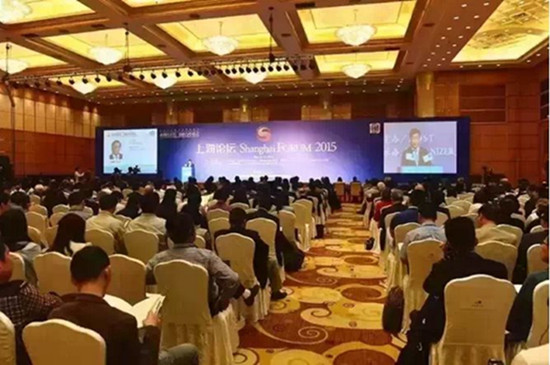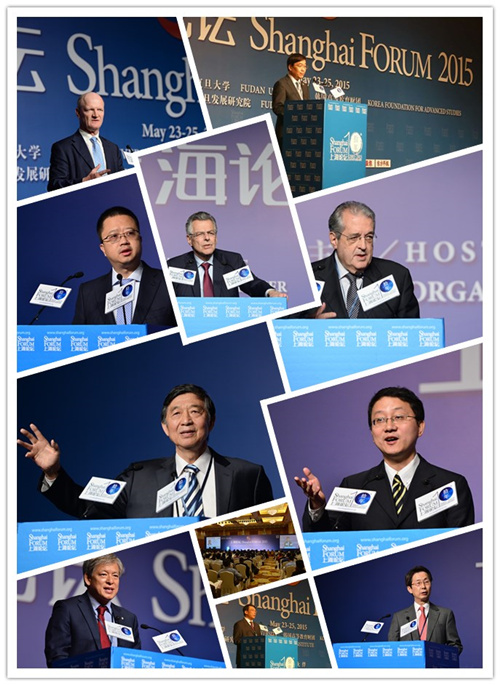Hello, welcome to visit Shanghai Forum
The opening ceremony of Shanghai Forum 2015 was held on Saturday, May 23 at the Shanghai International Convention Center (SICC). This year’s theme was “Economic Globalization and Asia’s Choice -Asia’s Responsibility: Exploring New Approaches to Cooperation.” Over 500 delegates from more than 40 countries attended the ceremony, hosted by Zhu Zhiwen, Chancellor of Fudan University, which included opening remarks from special guests including Tu Guangshao, Executive Vice Mayor of Shanghai; Xu Ningsheng, President of Fudan University; Yeom Jaeho, President of Korea University; Park In-kook, President of the Korea Foundation for Advanced Studies; Liu Jinsong, Deputy Director-General of the Department of International Economic Affairs in the Ministry of Foreign Affairs of China and Member of the Board of Directors, the Silk Road Fund Co. Ltd.

A series of keynote speeches, hosted by Park In-kook, followed the opening ceremony. These speeches included distinguished guests such as Vladmir Yakunin, President of JSC Russian Railways; Liang Xinjun, Vice Chairman and CEO of Fosun Group; Myron Scholes, Frank E. Buck Professor of Finance, Emeritus, at Stanford University and 1997 Nobel Laureate in Economics; Wu Jianmin, China’s former Ambassador to France and Member of the International Advisory Committee of the Chinese Foreign Ministry; Fabrizio Saccomanni, former Minister of Economy and Finances in Italy; and Rt Hon David Willetts, Visiting Professor at King’s College London and former UK Minister for Universities and Science. Their speeches served to introduce and bring light to current issues in Asia including politics, economics, foreign relations, culture, society, and the environment.
Following the keynote speeches was the opening banquet. Hosted by Lin Shangli, Vice President of Fudan University, it featured speakers including Ochi Takao, Parliamentary Vice-Minister of the Cabinet Office in Japan.
This year’s forum took place from May 23 to May 25 and consisted of nine roundtables that tackled issues of Asia’s development and its future in the face of globalization. These roundtables included: “Dealing with Asia’s Aging Challenges,” “How to Realize the Interconnecting One-Belt-One-Road,” “Can Asia Solve Its Own Security Problems?” “Collective Social Governance of Food Security,” “Opening of China’s Finance and Integration of Asia’s Markets,” “China in the Next Decade: Economic Growth and Fiscal/Financial Transformation,” “Reshaping East Asia through FTAs: Visions, Challenges, and Strategies,” “New Economy, New Finance, New Opportunities,” and “Information Society and Governance Innovation.”

In addition to these sub-forums, Shanghai Forum also hosted 5 panels about various themes pertinent to Asia’s development, consisting of economics, politics, governance, society, and the environment. Each panel has 3-4 sessions, with a total of 21 sessions.
Shanghai Forum also hosted a high-level dialogue, which featured Ben S. Bernake, former Chairman of the Board of Governors of the United States Federal Reserve System, and Zhang Yun, Dean of the School of Economics, Director of the China Center for Economic Studies at Fudan University, and Vice Dean at Fudan Development Institute.
First held in 2005, Shanghai Forum is hosted by Fudan University and the Korea Foundation for Advanced Studies and is organized by the Fudan Development Institute, a new research organization for higher education. Over the past ten years, Shanghai Forum has worked to bring attention to key issues facing Asian countries in today's globalizing economy. It has become an integral tool for communication for both Asian countries as well as the rest of the international community, and will undoubtedly continue to be one of the most influential international academic forums for years to come.

